-
 Bitcoin
Bitcoin $84,135.7201
0.87% -
 Ethereum
Ethereum $1,856.7400
-0.02% -
 Tether USDt
Tether USDt $0.9999
0.01% -
 XRP
XRP $2.0830
-0.48% -
 BNB
BNB $599.6471
-1.52% -
 Solana
Solana $124.1742
-1.63% -
 USDC
USDC $1.0000
0.00% -
 Dogecoin
Dogecoin $0.1685
-0.86% -
 Cardano
Cardano $0.6668
-0.74% -
 TRON
TRON $0.2373
1.25% -
 Toncoin
Toncoin $3.9998
-2.25% -
 Chainlink
Chainlink $13.4300
-2.39% -
 UNUS SED LEO
UNUS SED LEO $9.4081
2.84% -
 Stellar
Stellar $0.2651
-0.61% -
 Avalanche
Avalanche $18.9065
-2.21% -
 Sui
Sui $2.3226
0.33% -
 Shiba Inu
Shiba Inu $0.0...01220
-4.19% -
 Hedera
Hedera $0.1637
-1.21% -
 Polkadot
Polkadot $4.0401
-2.75% -
 Litecoin
Litecoin $81.7427
-3.19% -
 MANTRA
MANTRA $6.2137
-1.54% -
 Bitcoin Cash
Bitcoin Cash $304.6167
-1.46% -
 Bitget Token
Bitget Token $4.5737
-0.87% -
 Dai
Dai $1.0001
0.02% -
 Ethena USDe
Ethena USDe $0.9998
0.01% -
 Pi
Pi $0.6840
-4.49% -
 Hyperliquid
Hyperliquid $13.0177
-2.77% -
 Monero
Monero $215.7064
-0.75% -
 Uniswap
Uniswap $6.0376
-1.26% -
 Aptos
Aptos $5.2618
-0.89%
Is the income from pledge mining affected by the number of pledged coins?
The income from pledge mining is influenced by the number of pledged coins, but factors like network participation and block reward size also play significant roles.
Apr 01, 2025 at 03:29 am
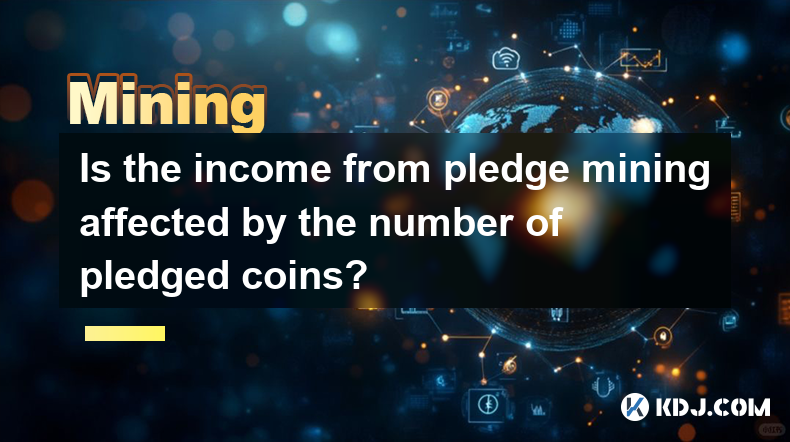
The Relationship Between Pledged Coins and Mining Rewards
The simple answer is: yes, the income from pledge mining is generally affected by the number of pledged coins. However, the relationship isn't always linear and depends heavily on the specific mechanism employed by the cryptocurrency project. Let's explore the nuances.
Many pledge mining systems operate on a proportional reward system. This means the more coins you pledge, the larger your share of the total block rewards or staking rewards. This is because your contribution to the network's security and validation is proportionally larger. Think of it like owning a larger percentage of a company – you receive a larger share of the profits.
However, it's crucial to understand that this proportionality isn't always a direct 1:1 relationship. Some protocols might have diminishing returns. This means that while increasing your staked coins will increase your rewards, the rate of increase might slow down as your stake grows larger. This is often implemented to prevent a few large players from dominating the network and potentially centralizing it.
Factors Influencing Pledge Mining Income Beyond the Number of Coins
Beyond the sheer quantity of pledged coins, several other factors influence your income:
Network Participation Rate: A higher network participation rate (more people staking) means your share of the rewards is diluted. Even with a large stake, your relative percentage of the total staked coins might be smaller in a highly saturated network.
Block Reward Size: The cryptocurrency's protocol determines the size of the block reward. If the block reward is reduced through halving events or other mechanisms, your income will decrease even if your staked amount remains the same.
Validator Selection Algorithm: Different consensus mechanisms (Proof-of-Stake, Delegated Proof-of-Stake, etc.) have varying validator selection algorithms. Some might prioritize smaller validators to maintain decentralization, while others might simply select proportionally to the stake size.
Transaction Fees: In some systems, a portion of transaction fees is distributed to validators. Higher network activity, resulting in more transactions, can lead to increased income, regardless of the number of pledged coins. However, this is usually a smaller portion compared to block rewards.
Network Congestion: High network congestion can sometimes affect the frequency of block creation or the efficiency of the consensus mechanism, potentially impacting your earnings.
Understanding Different Pledge Mining Models
Different cryptocurrencies employ different pledge mining models, each with its own dynamics:
Proof-of-Stake (PoS): In PoS, validators are selected proportionally to their stake. A larger stake generally increases the likelihood of being selected to validate blocks and earn rewards.
Delegated Proof-of-Stake (DPoS): In DPoS, users delegate their coins to a chosen validator. The validator earns rewards based on the total coins delegated to them. Your income depends on the performance and success of the chosen validator.
Liquid Staking: Liquid staking allows you to stake your coins while maintaining liquidity. You receive a derivative token representing your staked coins, which can be traded on exchanges. Your income is generated through the staking rewards, which are usually distributed to you in the derivative token.
The specifics of how your pledged coins translate into income are defined by the smart contracts and algorithms governing the specific cryptocurrency's pledge mining system. It's crucial to carefully review the documentation of the project before participating.
Illustrative Examples of How Stake Size Impacts Rewards
Let's consider two hypothetical scenarios in a PoS system:
Scenario 1: You stake 100 coins in a network with a total staked supply of 10,000 coins. Your share is 1%, and you receive 1% of the block rewards.
Scenario 2: You increase your stake to 1,000 coins. Now, your share is 10%, and you receive 10% of the block rewards, a tenfold increase. However, if the total staked supply also increases significantly, your percentage might not increase tenfold.
This highlights the importance of considering the overall network participation rate.
Addressing Potential Complications
The calculation of rewards is often complex and may involve factors beyond simple proportionality. Some systems might introduce penalties for withdrawing your stake prematurely or for being offline for extended periods. Understanding these penalties is crucial to avoid unexpected losses.
Furthermore, the value of the earned cryptocurrency is subject to market volatility. Even if your pledge mining income is high in terms of the native token, its USD value can fluctuate significantly.
Frequently Asked Questions
Q: Does a larger stake always guarantee higher returns in pledge mining?
A: Not necessarily. While a larger stake generally increases your share of rewards, factors like network participation rate, block reward size, and validator selection algorithms significantly impact your final income. Diminishing returns are also common in some systems.
Q: Are there any risks associated with pledge mining?
A: Yes, there are risks. These include smart contract vulnerabilities, slashing penalties (loss of staked coins for misbehavior), and the inherent volatility of cryptocurrency prices. Always thoroughly research the project before participating.
Q: How do I choose a suitable pledge mining project?
A: Research is key. Consider factors like the project's reputation, the security of its smart contracts, the consensus mechanism used, the total supply of the cryptocurrency, and the overall network activity. Look for audited smart contracts and transparent governance.
Q: What are the tax implications of pledge mining income?
A: Tax laws regarding cryptocurrency income vary significantly by jurisdiction. It's crucial to consult with a tax professional to understand your obligations and comply with applicable regulations. Your income from pledge mining is generally considered taxable income.
Disclaimer:info@kdj.com
The information provided is not trading advice. kdj.com does not assume any responsibility for any investments made based on the information provided in this article. Cryptocurrencies are highly volatile and it is highly recommended that you invest with caution after thorough research!
If you believe that the content used on this website infringes your copyright, please contact us immediately (info@kdj.com) and we will delete it promptly.
- Ethereum (ETH) Price Prediction: Whale Activity and Market Sentiment Amid Volatility
- 2025-04-02 15:35:12
- The Best VPNs for 2025: Our Top 3 Picks
- 2025-04-02 15:35:12
- The cryptocurrency market shows restrained activity as the United States prepares to issue new tariffs announcements.
- 2025-04-02 15:30:12
- Top Stablecoin Issuer Circle Officially Files for IPO
- 2025-04-02 15:30:12
- Stablecoin giant Circle (USDC) is gearing up for its Initial Public Offering (IPO)
- 2025-04-02 15:25:12
- Dogecoin (DOGE) Stretched Toward Resistance Levels as Bitcoin (BTC) Extends Its Bullish Momentum
- 2025-04-02 15:25:12
Related knowledge
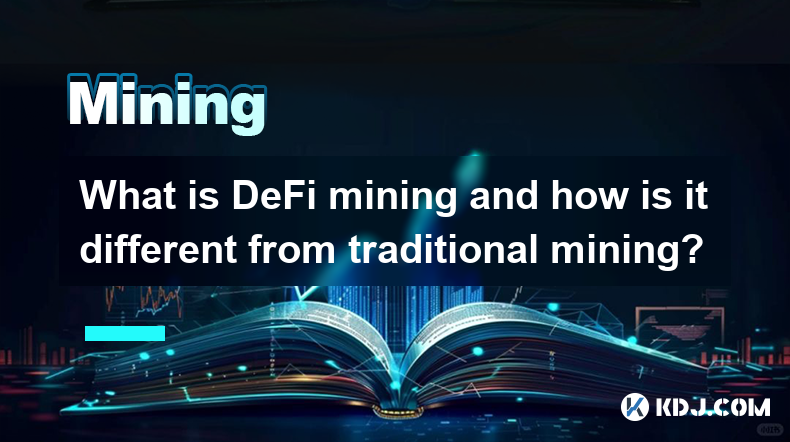
What is DeFi mining and how is it different from traditional mining?
Apr 02,2025 at 09:50am
DeFi mining, also known as yield farming or liquidity mining, is a process within the decentralized finance (DeFi) ecosystem where users provide liquidity to decentralized platforms in exchange for rewards. Unlike traditional mining, which involves solving complex mathematical problems to validate transactions and add them to a blockchain, DeFi mining f...
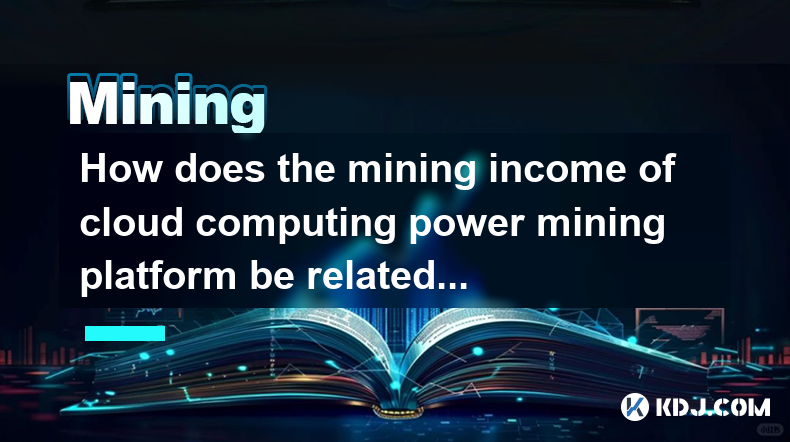
How does the mining income of cloud computing power mining platform be related to mining pool allocation?
Apr 02,2025 at 01:56am
The relationship between the mining income of a cloud computing power mining platform and the allocation of mining pools is a crucial aspect of cryptocurrency mining. Mining income is influenced by various factors such as the efficiency of the mining hardware, electricity costs, and the specific cryptocurrency being mined. However, the allocation of min...
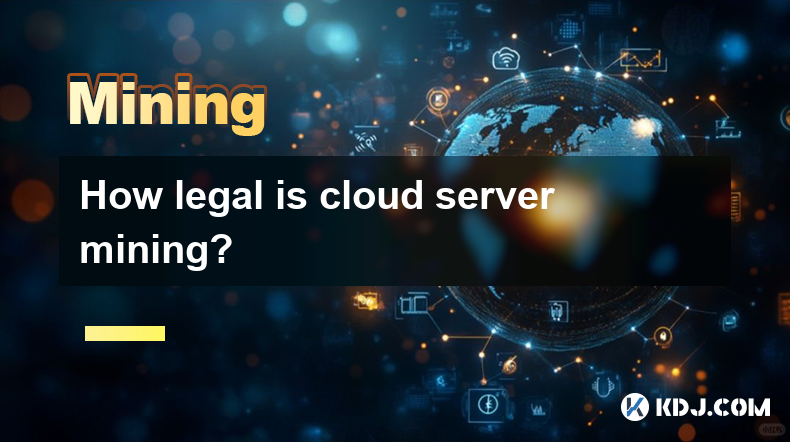
How legal is cloud server mining?
Apr 01,2025 at 08:08am
Cloud server mining has become an increasingly popular method for individuals and companies to participate in cryptocurrency mining without the need for expensive hardware and high electricity costs. However, the legality of cloud server mining can be a complex issue, as it varies by jurisdiction and depends on several factors. This article will explore...
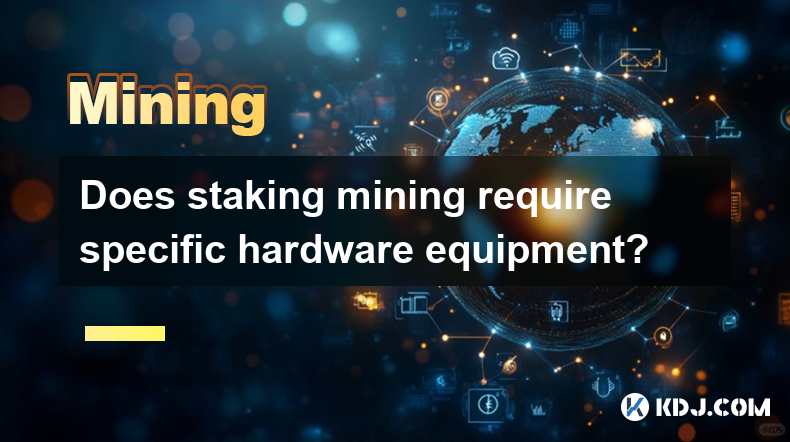
Does staking mining require specific hardware equipment?
Apr 02,2025 at 08:21am
Staking mining, often referred to simply as staking, is a process used by various cryptocurrencies to secure their networks and validate transactions. Unlike traditional mining, which often requires specialized hardware like ASICs (Application-Specific Integrated Circuits) or high-performance GPUs (Graphics Processing Units), staking typically does not ...
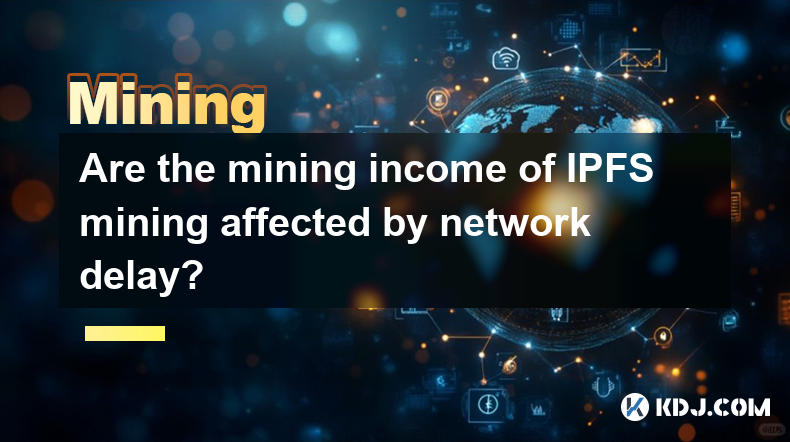
Are the mining income of IPFS mining affected by network delay?
Apr 01,2025 at 09:36pm
Are the Mining Incomes of IPFS Mining Affected by Network Delay? Understanding IPFS Mining and Network Delay's ImpactIPFS (InterPlanetary File System) mining, unlike Bitcoin mining, doesn't involve solving complex cryptographic puzzles. Instead, it focuses on providing storage and bandwidth to the network. Miners earn rewards for storing and sharing dat...
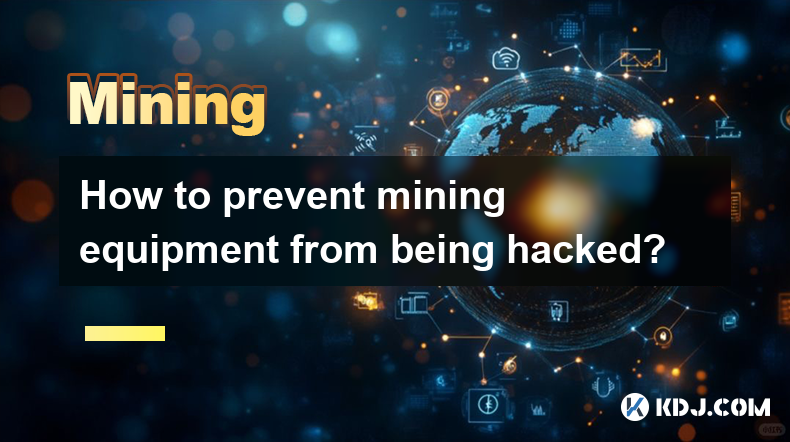
How to prevent mining equipment from being hacked?
Apr 01,2025 at 06:22am
Understanding the ThreatsCryptocurrency mining, while potentially lucrative, exposes your equipment to various cyber threats. These threats range from simple malware infections that steal your mining profits to sophisticated attacks that hijack your entire operation. Understanding these threats is the first step in effective protection. This includes r...

What is DeFi mining and how is it different from traditional mining?
Apr 02,2025 at 09:50am
DeFi mining, also known as yield farming or liquidity mining, is a process within the decentralized finance (DeFi) ecosystem where users provide liquidity to decentralized platforms in exchange for rewards. Unlike traditional mining, which involves solving complex mathematical problems to validate transactions and add them to a blockchain, DeFi mining f...

How does the mining income of cloud computing power mining platform be related to mining pool allocation?
Apr 02,2025 at 01:56am
The relationship between the mining income of a cloud computing power mining platform and the allocation of mining pools is a crucial aspect of cryptocurrency mining. Mining income is influenced by various factors such as the efficiency of the mining hardware, electricity costs, and the specific cryptocurrency being mined. However, the allocation of min...

How legal is cloud server mining?
Apr 01,2025 at 08:08am
Cloud server mining has become an increasingly popular method for individuals and companies to participate in cryptocurrency mining without the need for expensive hardware and high electricity costs. However, the legality of cloud server mining can be a complex issue, as it varies by jurisdiction and depends on several factors. This article will explore...

Does staking mining require specific hardware equipment?
Apr 02,2025 at 08:21am
Staking mining, often referred to simply as staking, is a process used by various cryptocurrencies to secure their networks and validate transactions. Unlike traditional mining, which often requires specialized hardware like ASICs (Application-Specific Integrated Circuits) or high-performance GPUs (Graphics Processing Units), staking typically does not ...

Are the mining income of IPFS mining affected by network delay?
Apr 01,2025 at 09:36pm
Are the Mining Incomes of IPFS Mining Affected by Network Delay? Understanding IPFS Mining and Network Delay's ImpactIPFS (InterPlanetary File System) mining, unlike Bitcoin mining, doesn't involve solving complex cryptographic puzzles. Instead, it focuses on providing storage and bandwidth to the network. Miners earn rewards for storing and sharing dat...

How to prevent mining equipment from being hacked?
Apr 01,2025 at 06:22am
Understanding the ThreatsCryptocurrency mining, while potentially lucrative, exposes your equipment to various cyber threats. These threats range from simple malware infections that steal your mining profits to sophisticated attacks that hijack your entire operation. Understanding these threats is the first step in effective protection. This includes r...
See all articles

























































































